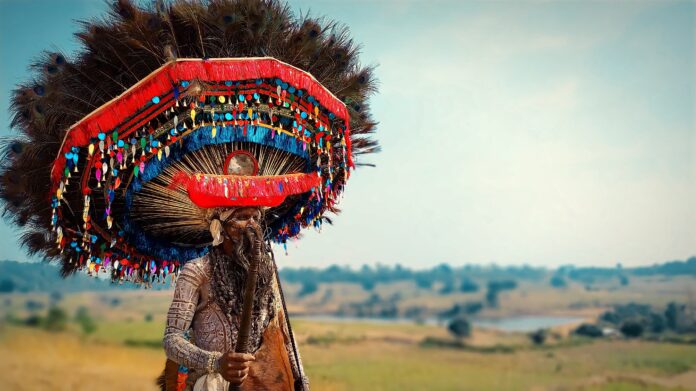
The Lost Paradise of Jiwati Adivasis
Through the Lens of the Tehsildar
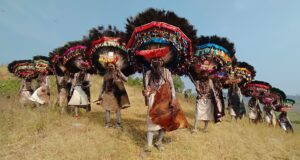
The evening of 10th March. The premises of the Jiwati Tehsil Office is overflowing with large crowds of Adivasis from the across the taluka. For once, this was neither a protest rally nor the public meeting of a political neta. They have been invited to witness the first screening of a film The Lost Paradise made by the Tehsildar of Jiwati, Avinash Shembatwad. It is an exciting occasion as the audience is delighted to see their villages and their life stories on the screen – there is much enthusiasm and clapping. Later one of them tells me with pride in his voice, “This is the first time some one ever made a film about us!” Undoubtedly, Avinash Shembatwad has made an important contribution towards documenting the Adivasi culture of Jiwati, and this is much appreciated by the local people.
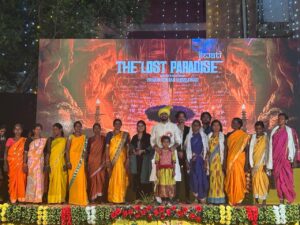
The Lost Paradise traces the history of the Adivasis – the Gonds, Pardhans and Kolams tribes of Jiwati. The ‘actors’ are all local villagers of Kodepur and Mahapandharwani villages, the language a mixture of Gondi and the music is played on the traditional Adivasi instruments such as Ghumela, Vetti and Tirpya. The breathtaking beauty of the Manikgad Hills, the variety of fauna and flora and the colourful culture and spiritual practices of the Adivasis were captured with almost poetic sensitivity.
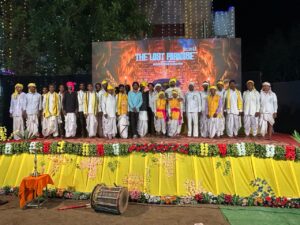
The Lost Paradise tells the story of Adivasis of Jiwati taluka who live in the far-flung corner of Maharashtra, on the edge of Telengana border. A neglected region for many decades, the Adivasis have suffered much and continue to do so as they lose land to strip mining, as crops fail and their culture is threatened. The film begins with the exploration of the mysterious caves called ‘Jangudevicha Mahal’ (The Palace of Goddess Jangudevi) in which an Adivasi priest leads the way deep into the ancient caves as the voice-over in Marathi tells us how difficult it becomes to breathe as ever step takes one deeper into the bowels of the earth. From the depths of the earth, the film emerges to the heights of the Manikgad hills and forests as it establishes the Adivasi as the cultural heirs of this naturally endowed, forest laden area.
The forty minute documentary does not flag for a minute as it swiftly covers the challenge of holding on to ancient rites and customs in the face of burgeoning modernisation and crop failures due to climate change. In the film at least the Adivasi villagers are able to conduct their annual harvest celebration of Dandar and Ghusadi and the film ends with a conversation with the god-like Ghusadi and a small boy – symbolic of the ancient wisdom and practices being passed over to the next generation.
Avinash Shembatwad has written and directed the film, putting his knowledge of the place and the people to good use. It is a well-researched film which places nuggets of information about Adivasi life and culture within the large narration. The photography by Ajay Ghadge and the music by Tanmay Sancheti deserves appreciation as also the rest of the team for the efforts that they have put in.
The film was financed by the Integrated Tribal Development Project, Chandrapur.
About Avinash Shembatwad
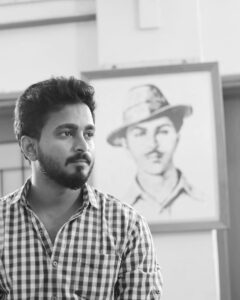
Avinash Shembatwad (31) the Probationary Tehsildar of Jiwati who is also a talented film-maker joins the list of Maharashtra’s artistic civil servants which include the writer Vishwas Patil and the poet Prabhu Rajgadkar. He joined public service in 2022 even though his first love remains direction and screenplay. He dropped out of Chemical Engineering from the Institute of Chemical Technology, Mumbai to pursue film-making and eventually completed MA Political Science from IGNOU, Pune. The Lost Paradise is this third film. Before this he has made Yathavkash, a feature based on struggles of competitive exam aspirants in Maharashtra and Chunaav a short film to highlight importance of participation in elections in tribal areas. Yathavkash won the best feature film award at Mumbai Independent Film Festival and Chunaav was the winner of the best social film and nominated for Dadasaheb International Film Festival.
When asked what inspired him to make The Lost Paradise, Shembatwad said, “My first field visit as probationary Tehsldar in Chandrapur was at Jiwati. We were taken to the Jangudevi Jatra and I was completely fascinated, Fortunately, I was later posted as Tehsildar at Jiwati and got the opportunity to learn more about the tribal culture and traditions and the philosophy behind tribal way of living. Their relationship with nature is what the world needs to know and adopt. The film is my sincere attempt to communicate what I learned about Adivasi way of life and philosophy.”
- Paromita Goswami


